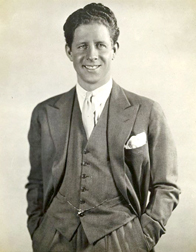In Chapter 21 of his 1930 memoir, Vagabond Dreams Come True, Rudy Vallée reveals how he came to use his signature megaphone while performing and how he felt about “copycat” orchestras that sprung up when Vallée’s Connecticut Yankees hit it big.
Originality
WHILE WE WERE in Hollywood making our picture we found it impossible to broadcast back to the East. In the first place it was necessary that we be prepared to work on the picture at any hour, day or night, and secondly the line charges for broadcasting across the continent runs into thousands of dollars and the reception in the East at best is never good when transmitted over three thousand miles; but radio fans become very devoted and attached to their radio favorites and many of ours seemed to resent our disappearance from the air even after I had told them we would be away for no longer than eight weeks.
 These letters from our very devoted fans who upbraided us for going off the air made me very happy. But the letters I received from those who were confined to sick rooms and who found our music a comfort in their illness, and especially some notes I received from a little blind colony just outside of New York, these made me feel slightly conscience-stricken.
These letters from our very devoted fans who upbraided us for going off the air made me very happy. But the letters I received from those who were confined to sick rooms and who found our music a comfort in their illness, and especially some notes I received from a little blind colony just outside of New York, these made me feel slightly conscience-stricken.However, something almost laughable had happened in the broadcasting of dance music just before we left for the Coast which made me feel more at ease when I received these letters. It is a well-known fact in theatrical circles that our vaudeville appearances were sensational. Nearly everyone knew, too, that it was our radio broadcasts which had brought this popularity and it is a truism that whenever any product, person or group of persons achieve success in a particular way or through a particular method, that those who likewise desire to achieve success are quick to adopt the same methods and ideas.
Our sudden rise was the cue for other small and comparatively unknown broadcasting orchestra leaders who had been broadcasting for years, possily even before we had gone on the air, to drop their own style and to study our presentation over the air in hopes of discovering just what that something was which had won over our radio audiences. In fact, several of these leaders were frank enough to write or visit me and ask me to show them just how we broadcast and thereby aid them in achieving success. They were honest enough to admit that they too hoped that their adoption of our style would result in as a great a popularity for them.
By July and August just preceding our trip to the Coast, this adoption of our particular style had become a fact according ot the thousands of letters which reached me from listener-in, in which they all asked me if I was going to do something about it. Some showed me copies of letters, very denunciatory in tone, which they had sent to the radio stations asking them why they permitted such an obvious imitation.
But realizing that imitation is the sincerest form of flattery and reliazing there was room enough for all of us, I said nothing, and in fact was pleased as the vogue we had apparently created. Then as these unhappy letters from those who missed us reached me, I felt consoled in the thought that in a way those orchestras back East that had admittedly attempted to present a program over the air in the simple style that had brought us such a wonderful reward, these orchestras helped make our absence less keenly felt.
